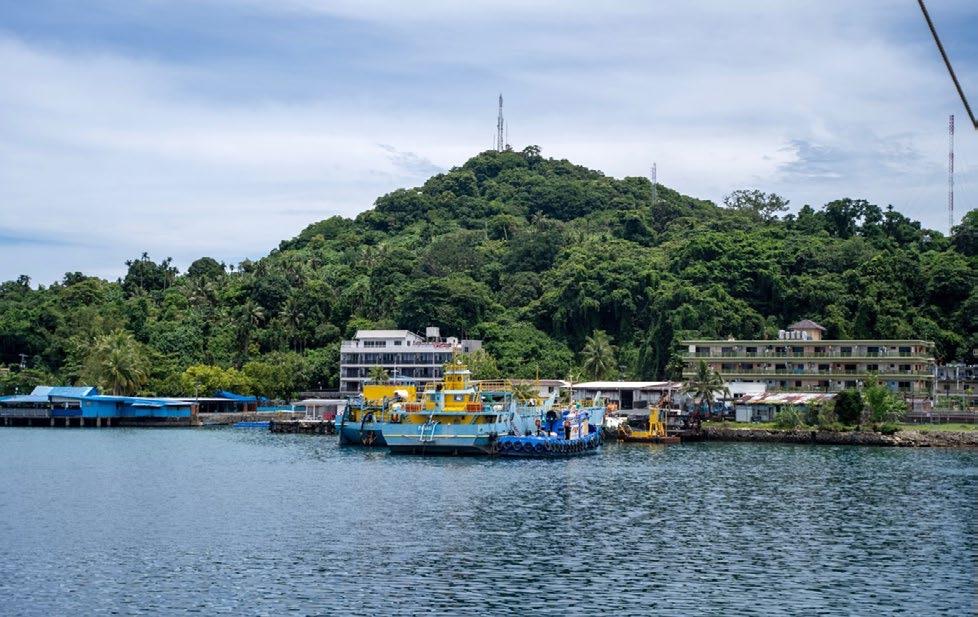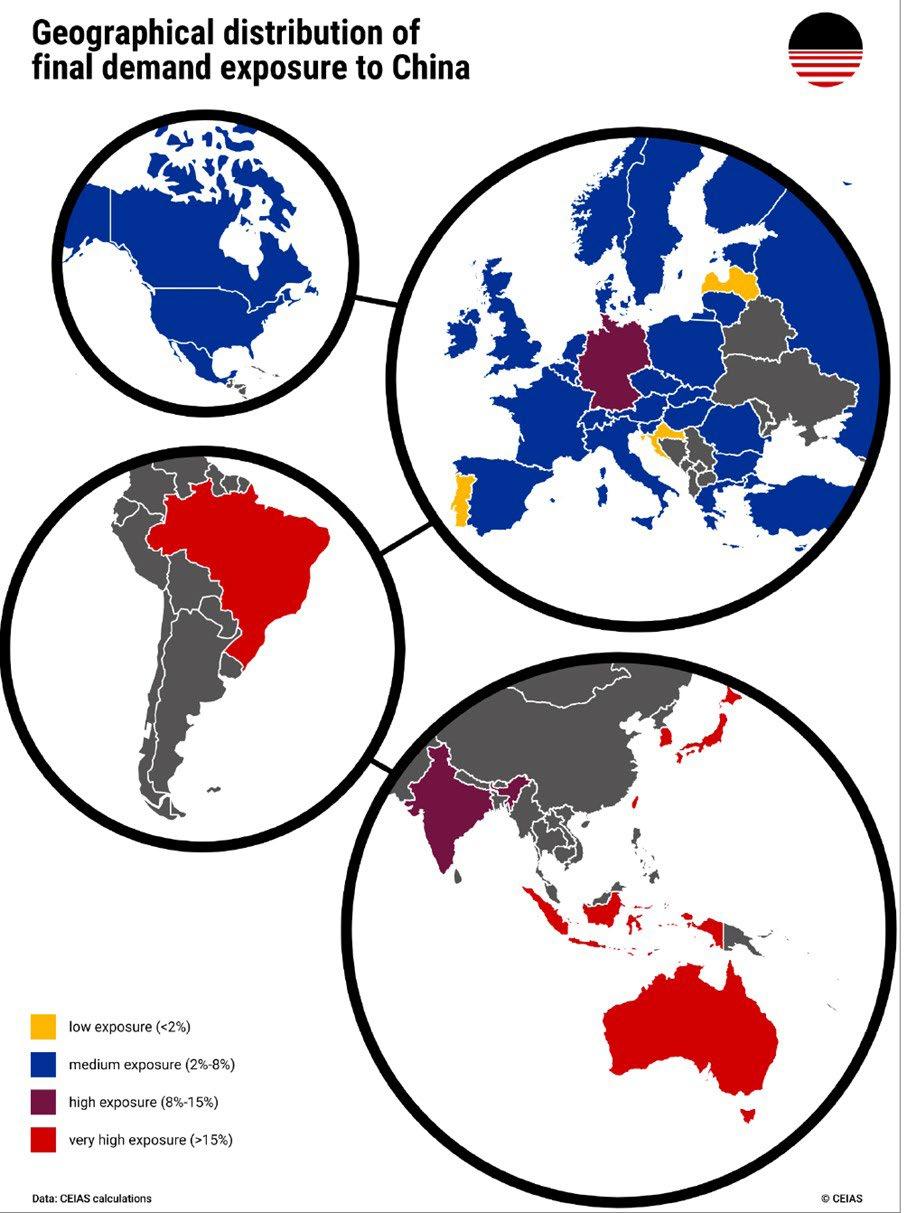CHINESE FOOTPRINT IN EUROPE



The Communist Party of China (CPC) is upending the security system both in the Indo-Pacific and Europe. The People‘s Republic of China (PRC) is now a threat to the political and economic integrity of the European Union (EU) alongside the bloc‘s security and independence. In addition, China is secretly luring countries into economic, legal, and technological dependencies to undermine EU-wide political sovereignty. Yet most EU nations seek China as a trading partner––and not a systemic rival. Chinese companies have over the past decade invested in EU ports and airports, but also electrical companies and telecommunications––while Chinese universities have offered scholarships to foreign citizens. The situation is, however, slightly different in Central and Eastern Europe (CEE). As former Soviet republics and satellite states, with a bitter experience of the Soviet Union during and in the aftermath of World War II, CEE states are wary of Communism and the
Chinese ideology that overlaps with the Western European approach. The author of the following paper insisted repeatedly that Russia was just a prelude while the real threat indeed emanated from China 1. Furthermore, all states know when Russia attacks or meddles in the domestic affairs of other nations. However, China furtively makes other states dependent on it according to the plan Beijing has followed for decades now. Thus, leaders of the European Union nations should make systemic efforts to combat China––and not Russia––in the first place.
Europe‘s biggest vulnerability to the Chinese threat and its undemocratic system of values, clearly contrary to those cherished in the United States and Europe, is that European states believe Beijing is playing by the same rules. Euro-Atlantic states and their like-minded Indo-Pacific partners should lose 2 their own perspective and adopt that of the perpetrating state 3. Western states often fail
while hoping authoritarian regimes will eventually start to abide by international law And yet wars and other acts of terror tend to occur regularly, which shows gaps in international law, often exploited by state regimes, terrorist groups as well as lone wolves 4 . The Russian invasion in Ukraine showed on many occasions, both a priori and during hostilities, that the lack of understanding of what is behind the aggression translates into an unrealistic vision of the adversary as well as their pursuits and goals. According to Estonian Prime Minister Kaja Kallas, whom the author firmly believes to be chosen as the next chief of NATO, with China „it was the same as with Russia,“ an indisputable claim for Central and Eastern Europe 5 .
France and Germany‘s reliance on cheap Russian resources and their dependence on trade with China could be one explanation for why both are carrying out a policy that is neither anti-Chinese nor neutral. According to the author, the governments in Paris and Beijing are following a pro-Chinese policy. Chinese state-run companies, which are under the watchful eye of the CPC, have stakes in a wide range of European critical infrastructure, including airports, ports, electricity companies, wind and solar farms as well as telecommunications. Striking examples of Chinese economic interference could be found in Greece, Italy, Portugal, Belgium, the Netherlands, Germany, and France. A portion of the German port of Hamburg, which is now Europe‘s third-busiest port and its „gateway to the world,“ was acquired by Chinese company COSCO. German Chancellor Olaf Scholz reportedly backed a contentious deal despite opposition from fellow EU states and German intelligence agencies. One more example was two natural gas pipelines,
Nord Stream 1 and 2, running from Russia to Germany through Poland and other EU states. CEE nations have voiced objections against Berlin‘s plans, urging German authorities to abandon the project that undermines European solidarity––while doing business with Russia, a country seeking to restore its global image as a superpower, is an arrogant move causing harm to European security and stability.
The port of Piraeus in Athens, Greece, is Europe‘s biggest passenger port and the second largest such facility in the world, where the Chinese shipping company Cosco has been the majority. The company has the world‘s biggest fleet the author observed during cruises in Greece in May 2023. One more remark was Chinese investments in North Macedonia in February 2023. Chinese investors win infrastructure bids to build roads and tunnels in North Macedonia. Legally acceptable endeavors that yet lead to ethically questionable consequences of „Chinese colonization“ are nothing new in the Balkans. The one that wins a bid is willing to pay most while satisfying all conditions. While all domestic participant bidders fail to abide by all requirements, foreign-based firms are allowed to submit a competitive offer. Chinese companies do not have any competitors in Europe and nor do they in Africa, South America, and Oceania.
A researcher herself, the author focuses her attention on the fact that the CPC nurtures educational schemes so that the next generations think and act as the regime wishes. Chinese authorities are exerting influence on research and teaching at universities abroad, for example through Confucius Institutes and Chinese studies faculties. China targets academic rese-
4. Cf. J. Siekiera, Podcast for the U.S. Marine Corps: Fragile, Leaky, & Weak: Challenges for International Humanitarian Law, Brute Krulak Center for Innovation & Future Warfare, Marine Corps University (April 29, 2022): https://www.youtube.com/watch?v=rexBb_nzJSs&t=2237s
5. J. Liboreiro & A. Tidey, EU to provide Ukraine with €18 billion in financial assistance for 2023, says von der Leyen (October 21, 2022) “Euro News”: https://www.euronews.com/my-europe/2022/10/21/eu-to-provide-ukraine-with-18-billion-in-financial-assistance-for-2023-says-von-der-leyen
archers with grants, scholarships, and internships in the country. This does come at a price, though. Researchers are thus compelled to deliver research papers to the Party‘s liking, which distorts Beijing‘s actual political pursuits and its endeavors in the countries where China exerts a multifaceted influence.
China continues to compromise EU-wide legal and political stability by making European leaders align their strategies with what Beijing seeks. While referring to the Communist Party of China, senior EU officials speak a soft language („We should cooperate to avoid confrontation in the region,“ EU Foreign Affairs chief Josep Borrell, „The EU should not be naive about China, but also avoid systematic confrontation,“ European Council president Charles Michel). This is a sign that the bloc does not position itself as a trade partner, but instead, it aligns its policy, law,
or declaration to what Chinese authorities aspire for. EU officials meet with their Chinese counterparts to discuss climate change. China, which is the world‘s biggest emitter of greenhouse gases, does not rush any emissions-reducing schemes but managed to suggest that the EU address environmental concerns.
Leaders of the European Union‘s member states invited Chinese companies to invest in European critical infrastructure. No Chinese company would ever allow a European company to do the same. Chinese companies own or have stakes in a wide range of European critical infrastructure, electricity companies, wind and solar farms as well as telecommunications. Given that Chinese companies have access to a number of types of facilities, Beijing is aware of both state and private investments and where supply chains run. In other words, the CPC has been given a digital


map of Europe that its officials could use for their benefit and to the detriment of Europeans. Train travels in Germany, France, and Poland have already been disrupted, probably due to cyberattacks. Local authorities and media outlets often blame bad weather or system overloads so as not to spread panic. Naturally, it is challenging to detect who is behind any malicious attack––yet with China still owning or managing the system, chances are high that back door or kill switches have been installed.
China has emerged as a global leader in artificial intelligence and digital infrastructure management. Beijing uses these areas of research to exert profound political pressure on other nations in the ongoing digital transformation of the global economy. Although EU states repeatedly accused China of promoting corruption and debt trap practices that lure poor countries into debt to secure assets, France and China are often in talks with Beijing to seek advice on the economy and new technologies. In June, Chinese Prime Minister Li Qiand traveled to Berlin to attend the Sino-German intergovernmental consultations while French President Emmanuel Macron arrived in China in April to cement trade ties with Beijing––despite Chinese destabilizing displays of stronger military power in the Pacific where some French overseas territories are located. Chinese President Xi Jinping used Macron‘s trip to Beijing for propaganda purposes to prove his allegedly friendly ties with Western European nations.
The greatest fear is that critical infrastructure could be taken out by China in a situation of conflict, natural disaster, major sports events, or a pandemic. The real concern is that state institutions and private entities in Europe depend
largely on China for digital solutions. Certainly, the United States seeks to prevent China, with its competitive offers to roll out 5G infrastructure, from controlling networks across Europe.
The solution to China‘s dangerous strategy of expanding influence also in Europe is to adopt tough law and raise awareness of the threat posed by the CPC and its values. Thus, the author of the following text endorses efforts to rebuild robust and reliable ties with the United States in a number of areas of priority. Due to some economic, political, and military shortcomings, European states are not capable of standing as a neutral entity between the United States and China. Thus, both EU members and non-EU states need a U.S. security umbrella. One of the most examples of mutual ties is the U.S. presence on the eastern flank, notably in Poland, a strategic American ally. It is vital to understand both interests of the CPC and the methods it uses to tacitly colonize other states to adopt effective legal measures to combat this phenomenon. The United States and the European Union should develop a set of coherent solutions in the areas such as economy, public policy, and technology. Chinese authorities easily circumvent European norms, which poses a threat to the bloc‘s security, stability, and sovereignty. Perhaps China will continue to expand its footprint in Europe, compromising its security and data protection system.
The CEE states, which are also part of the Three Seas Initiative, prefer the Euro-Atlantic partnership over political and economic reliance on China. Now it is high time Western European states cut toxic ties with the People‘s Republic of China while rebuilding a close relationship with the United States that benefits both Europe and the U.S.
Joanna Siekiera is an international lawyer with a PhD in public policy studies. She works as a legal advisor and lecturer in many military institutions: NATO, the US Marines, the armed forces of Finland and Turkey, among others. She completed a post-doctorate at the University of Bergen in Norway and a PhD at the University of Victoria in New Zealand. She is the author of 100 scientific publications in several languages, 40 legal opinions for the Polish Ministry of Justice and the book “Regional Policy in the South Pacific,” and the editor of 7 monographs on international law, international relations and security.
The opinions given and the positions held in materials in the Special Report solely reflect the views of authors.
Warsaw Institute
Wilcza St. 9, 00-538 Warsaw, Poland +48 22 417 63 15 office@warsawinstitute.org
